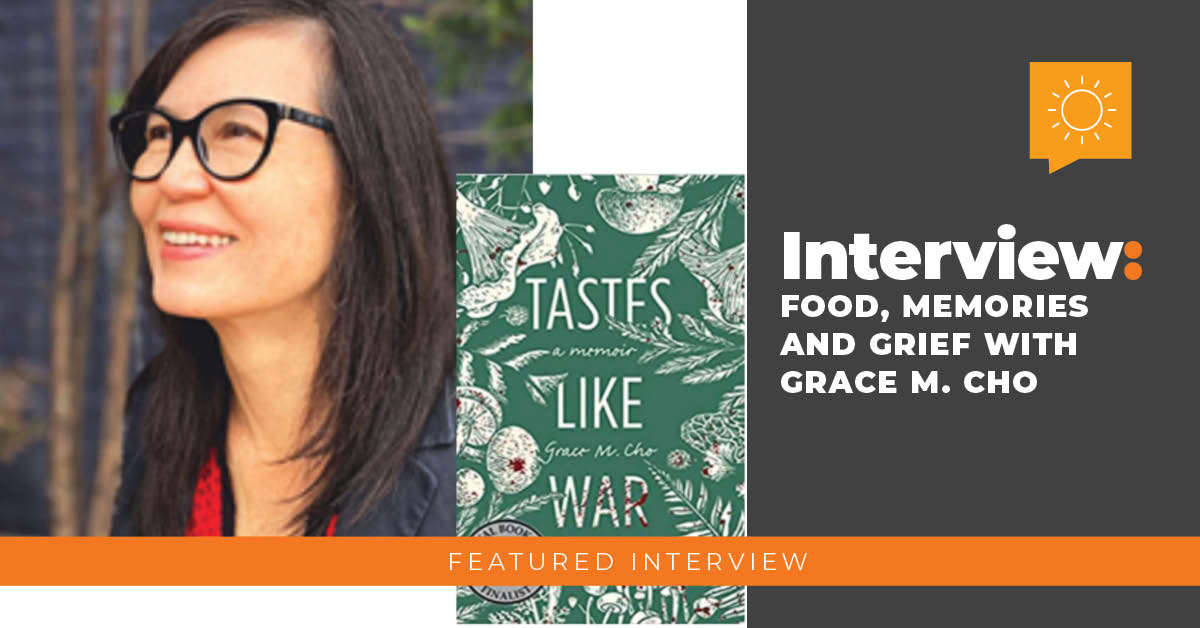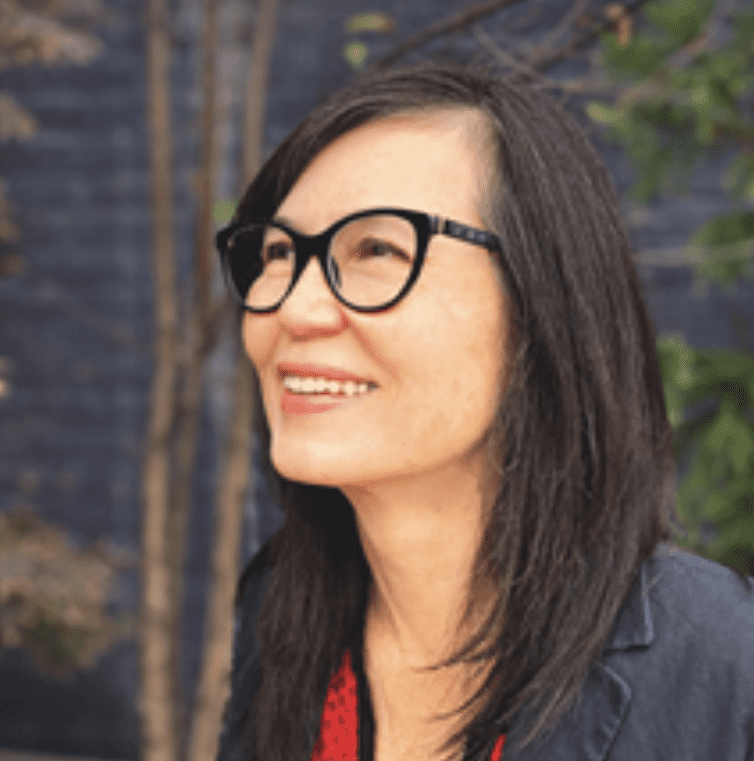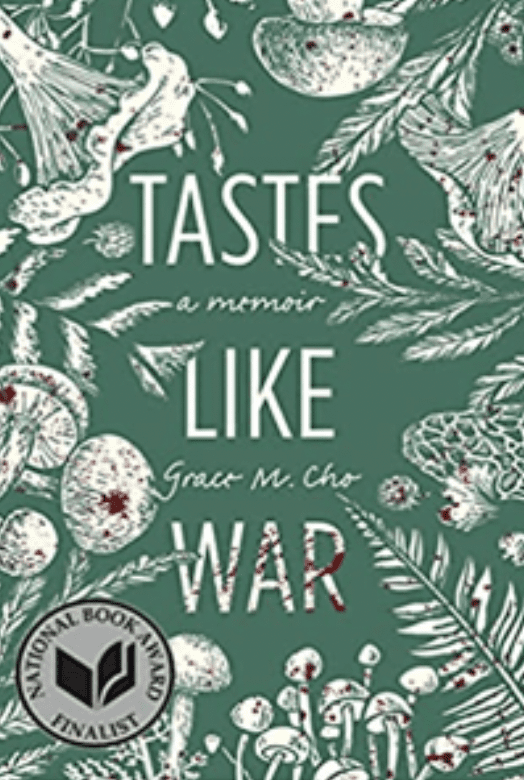By Alyse Mgrdichian

Food is a powerful thing. As a person of Middle Eastern heritage, I understand the ability food has to bring people together, spark memories, and heal wounded souls. With this in mind, I was very excited to get the opportunity to speak to Grace M. Cho, the author of Tastes Like War, which was published in May 2021 by Feminist Press. The book itself is a memoir, in which Dr. Cho uses food to discover her family’s history and reconnect with her mother, who was diagnosed with schizophrenia.
THE FIRST QUESTION I FOUND MYSELF WANTING TO ASK DR. CHO HAD TO DO WITH FOOD – NAMELY, HOW DOES FOOD HAVE THE POWER TO REVEAL THE PAST AND PROVIDE A SENSE OF IDENTITY, CLOSURE, OR BELONGING? SHE PROVIDED AN INTERESTING RESPONSE.
GMC: The memories of our childhood foods are imprinted upon us in a profound way – not just the taste of them, but the people, places, and contexts associated with eating them. We often aren’t aware of how powerful food memories are until something triggers them. For example, if I haven’t eaten something since my childhood, and then I eat it again, the sensory experience can unseal a vault in my unconscious. I write about how, after my mother’s death, the taste of kimchi unlocked very early memories of her feeding it to me. Also, cooking my grandmother’s dishes for my mother inspired her to talk to me about some of her childhood memories of Korea, which had rarely happened before. From an anthropological point of view, food is a marker of belonging and kinship. We belong to each other when we sit at a table and share a meal together.
I NOW FOUND MYSELF CURIOUS, WHAT SORT OF PLANNING WENT INTO DR. CHO REACHING HER MOTHER THROUGH FOOD?
GMC: To be honest, I never really put much thought into trying to reach her through food. It was something that just happened organically. As her mental illness progressed, she stopped doing a lot of things for herself. One of them was cooking. More and more, she needed other people to provide food for her, but at the same time she often rejected food. She argued with me for the first several months about how she didn’t want to eat my cooking because I was ‘wasting my time.’ I was in the first semester of my doctoral program, and she thought I should be studying instead. I’d sometimes get so frustrated that I’d break down in tears. But after a while she started to not only eat, but enjoy my cooking. When I was growing up, my mother was a passionate cook and a foodie (before anyone ever started using that term). In my adult life, I started to gauge her state of mind by her appetite. At the point when she started to crave Korean food enough to ask for it and teach me how to make it, I knew that something inside her was changing. Something between us was also starting to change. All those years of cooking for my mother healed some of the wounds from our past.
THIS MADE ME WONDER, DID DR. CHO’S MOTHER HAVE A FAVORITE DISH, SINCE IT SOUNDS LIKE DR. CHO COOKED (OR LEARNED TO COOK) QUITE AN ARRAY OF FOOD FOR HER?
GMC: My mother’s favorite food was a cheeseburger, medium rare, with cheddar and tomato. I used to think the first several months about how she didn’t want to eat my cooking because I was ‘wasting my time.’ I was in the first semester of my doctoral program, and she thought I should be studying instead. I’d sometimes get so frustrated that I’d break down in tears. But after a while she started to not only eat, but enjoy my cooking. When I was growing up, my mother was a passionate cook and a foodie (before anyone ever started using that term). In my adult life, I started to gauge her state of mind by her appetite. At the point when she started to crave Korean food enough to ask for it and teach me how to make it, I knew that something inside her was changing. Something between us was also starting to change. All those years of cooking for my mother healed some of the wounds from our past.
THIS MADE ME WONDER, DID DR. CHO’S MOTHER HAVE A FAVORITE DISH, SINCE IT SOUNDS LIKE DR. CHO COOKED (OR LEARNED TO COOK) QUITE AN ARRAY OF FOOD FOR HER?
GMC: My mother’s favorite food was a cheeseburger, medium rare, with cheddar and tomato. I used to think that it was a symbol of her life in America and the things she appreciated about coming here, but as I began doing research on the Korean War, I learned that many Koreans survived the near total devastation of its aftermath by scavenging in the dumpsters around the U.S. bases. Some survivors spoke of rescuing half-eaten hamburgers and hotdogs that the Americans threw out, making meals out of the discards. That bit of new knowledge made me rethink my mother’s relationship to the cheeseburger, imagining it as having a far more complex role in her psyche than I had first thought. Another favorite dish was saengtae jjigae, an oldfashioned fish stew, made with pollack and radishes. The first time I made it for her, she tried a spoonful of it and sighed, ‘I haven’t tasted this in forty years.’ It was a dish that reminded her of her mother, and it was one of her comfort foods towards the end of her life.
AS THE BIO OF TASTES LIKE WAR SUGGESTS, DR. CHO’S MOTHER EXPERIENCED THE ONSET AND MATURATION OF SCHIZOPHRENIA, A PSYCHIATRIC DISORDER MOST OFTEN CHARACTERIZED IN WESTERN MEDICINE BY DELUSIONS AND HALLUCINATIONS. DR. CHO WAS KIND ENOUGH TO TELL ME A BIT ABOUT WHAT IT WAS LIKE TO WATCH THE PROGRESSION OF HER MOTHER’S ILLNESS:
GMC: I don’t know exactly when it started, but I first noticed signs of it in 1986, when I was fifteen and my mother was forty-five. It had become pretty obvious by that point that she was experiencing deep mental distress. Some of the reasons for that did not immediately point to schizophrenia – her mother had died that year, her work environment was extremely toxic, she had experienced long-term sleep deprivation, and she was going through hormonal changes. I kept looking to these things as explanations, but she started to become increasingly ‘paranoid’ (to use the psychiatric language) about people she used to have good or neutral relationships with, and she began talking to herself. I later realized that she was hearing voices. At the time, I was all alone in dealing with this terrifying series of events because my father was a merchant marine and was at sea for months at a time, and my brother had moved out of the house when I was eleven. I was the one, along with my childhood best friend, who witnessed my mother’s unraveling. As a fifteen-year-old child, I tried my best to get help for her, but even the mental health professional I spoke to said that there was nothing they could do for her. It wasn’t until I began doing the research for this book, more than 30 years later, that I learned that, until recently, psychiatry didn’t recognize the onset of schizophrenia in middleaged women. All the research had been based on the experiences of men, who typically experience onset in their teens or twenties, but women’s onset is typically either in their twenties or in their forties, during perimenopause. This made me wonder if the counselor thought my mother had already been living with schizophrenia for decades, in which case treatment is much more difficult. I also learned that funding for community mental health was decimated in the 1980s, and mental health care centers sometimes let people with schizophrenia fall through the cracks so they wouldn’t use up too many resources.
FAMILIAL RELATIONSHIPS ARE A DELICATE THING, ESPECIALLY WHEN ONE PARTY IS UNDERGOING SEVERE PSYCHIATRIC CHANGES – I KNOW THIS FROM EXPERIENCE. THERE IS LOVE, BUT THERE IS ALSO CONFUSION AND A SENSE OF HELPLESSNESS. I WONDER, WHAT WAS IT LIKE FOR DR. CHO TO PUT HER AND HER MOTHER’S EXPERIENCES DOWN IN WORDS, EFFECTIVELY IMMORTALIZING THEIR RELATIONSHIP?
GMC: A friend of mine, who scattered my mother’s ashes with me, described the book as a ‘literary funeral,’ and I think that captures the essence of what it was like for me to write it. My family of origin was so fractured by the time my mother died that we didn’t come together to grieve the way most families do. And because my mother so rarely left her house and had a phobia of strangers, only a handful of the people in my life ever met her. The book was born out of my grief, and in a sense, my friend was right – it’s a 296-page eulogy. My intention in writing about my mother was always about wanting her to be seen as fully human, and to move away from individualistic notions of morality. She most likely became a sex worker in Korea out of necessity, but regardless of the reason a woman enters the sex industry, she shouldn’t be shamed for it. I’ve always been driven by the desire to seek justice for sex workers and for other stigmatized groups. I especially seek to combat the reductive stereotype of the ‘dangerous schizophrenic’ – my mother was so much more than either of these things, and I wanted to show off her gifts and talents through my earlier memories.
Mainly, I wanted to portray her as a hero, but without whitewashing her history. It was an ambitious goal, so of course I had doubts about how others would perceive my portrayal of her. Coming out of academia, I also had doubts about whether my writing would be engaging enough for a general readership. The one thing that gave me the confidence and motivation to write the story was that I knew my mother supported my first book, Haunting the Korean Diaspora. A couple members of my family vehemently opposed it, which led me to change my name so I could write. But my mother encouraged me to publish the first book, and she was the only person whose opinion mattered to me. I think she understood that I was denouncing the shame that had burdened her for most of her life, and of course, my success was a form of vindication for her.
TASTES LIKE WAR IS DR. CHO’S SECOND BOOK, SO I FOUND MYSELF CURIOUS ABOUT HOW HER SECOND WRITING EXPERIENCE COMPARED TO HER FIRST. DR. CHO REVEALS HOW HER METHODS OF RESEARCH DIFFERED AND OVERLAPPED:
GMC: In Tastes Like War, I drew heavily on the research I did for Haunting the Korean Diaspora regarding 1) the civilian experience of the Korean War and 2) the system of state-sanctioned prostitution for American troops. It wasn’t always a conscious decision to incorporate that research in my second book, but because it became so ingrained in the way I think about the historical and geopolitical context of my mother’s life, it naturally found its way into Tastes Like War.
When it came to doing research specifically for Tastes Like War, I focused on the narratives we have about what Western psychiatry classifies as ‘schizophrenia,’ as well as the social factors that can lead to its intensification. As memories of my childhood and young adulthood surfaced, I researched the places and events associated with those memories, such as the juvenile detention center where my mother used to work, and I found that it was notorious for sexual abuse. That was one of the puzzle pieces that helped me see the various traumatic events in my mother’s life as a continuum. It wasn’t as if she left all the trauma behind in Korea, but rather, she encountered new ones in the U.S. that resonated with her past. To answer your question about how the process was different for the two books, Haunting the Korean Diaspora was an experimental hybrid academic book that grew out of my doctoral dissertation, so the research was guided by a thesis and set of research questions that I had laid out at the start, whereas the research process for Tastes Like War was much more driven by the memories themselves.
I CHOSE TO END BY ASKING DR. CHO HOW HER RESEARCH INTERESTS IMPACT HER MISSION AND CALLING – HOWEVER, DR. CHO INFORMED ME THAT IT’S ACTUALLY THE OTHER WAY AROUND.
GMC: My lived experience has always guided my research interests. I was drawn to sociology and social theory as a way of making sense of my own life, and particularly the aspects that I came to identify as unjust. My early experiences – 1) growing up as one of the few immigrants or people of color in an American small town in the 70s and 80s, 2) being a girl coming of age during an era of rape culture, and 3) living with the aftereffects of the Korean War as they manifested in my mother’s mental illness – all led me to want to understand how these intimate experiences are part of larger social and geopolitical phenomena. As I do more research in these areas, my knowledge then reinforces my desire to deconstruct shame and secrecy. As a culture, we tend to project shame onto individuals whenever they bear the brunt of social problems, and when those individuals internalize the shame, it forecloses the possibility of public dialogue about those social problems. I want to see that changed.
Dr. Cho’s life story is a complicated one, full of pain and love in equal measure. Tastes Like War is, above all else, a daughter’s journey to discover her mother’s past, present, and future, whether it be through trauma, illness, or time itself. Dr. Cho watched her mother’s metamorphosis of self, unable to stop it from happening. However, with food and conversation, she was able to bridge the generational gap between them, giving voice to the experiences her mother had formerly refused to talk about. Tastes Like War is a book of grief and memories, which go hand-in-hand – grief is a painful thing that never fully goes away, but the memories that come with grief … those are what immortalize the people you’ve lost. To put those memories down on paper only seals the deal. And now, with a book dedicated to her life, Dr. Cho’s mother, although gone, will live forever.

Grace M. Cho is the author of Tastes Like War, a 2021 National Book Awards finalist, and Haunting the Korean Diaspora: Shame, Secrecy, and the Forgotten War, which received a 2010 book award from the American Sociological Association. Her writings have appeared in journals such as the New Inquiry, Poem Memoir Story, Contexts, Gastronomica, Feminist Studies, WSQ , and Qualitative Inquiry. She is associate professor of sociology and anthropology at the College of Staten Island, CUNY.
ABOUT THE BOOK:

TASTES LIKE WAR:
Grace M. Cho grew up as the daughter of a white American merchant marine and the Korean bar hostess he met abroad. They were one of few immigrants in a xenophobic small town during the Cold War, where identity was politicized by everyday details—language, cultural references, memories, and food. When Grace was fifteen, her dynamic mother experienced the onset of schizophrenia, a condition that would continue and evolve for the rest of her life. Part food memoir, part sociological investigation, Tastes Like War is a hybrid text about a daughter’s search through intimate and global history for the roots of her mother’s schizophrenia. In her mother’s final years, Grace learned to cook dishes from her mother’s childhood in order to invite the past into the present, and to hold space for her mother’s multiple voices at the table. And through careful listening over these shared meals, Grace discovered not only the things that broke the brilliant, complicated woman who raised her—but also the things that kept her alive.

Continue Reading…
Article originally Published in the February / March 2022 Issue: New & Upcoming.
